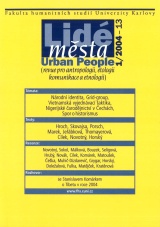National Tradition and Identity
DOI:
https://doi.org/10.14712/12128112.4348Abstract
Tbe article summarizes the results of the author´s recent works on the role of historical tradition in the forming of a national identity. He pursues the opinion that the issue is framed by the phenomenon of historical consciousness, which oscillates between two poles - crirical scientific knowledge and mythological, spontaneously appearing "memory". He then traces the sources of Czech national identity in pre-modern period as well as in the process of forming of a modern nation. Based on the typological setting of the place held by the formation of the Czech nation within the European context, the author then constructs some basic stereotypes that are influenced by this typological setting. Several concepts can be discerned from the "small nation'' type of development scheme. Firstly, the existence of a nation is nothing apparent but something that has been struggled for. Secondly, a "small nation'' therefore has to justify its existence. Thirdly, fear of losing a national existence and the corresponding stereotype of a defensive reflex, which might be an argument for moral exculpation. Pounhly, a nation has been formed via "bottom-up", by the emancipation of people and is therefore founded on the idea of people as the base of a nation. Fifthly, certain elements of provincialism are found, and lastly, a nation formed itself in opposition to the state-political system and had to break the old legitimacy: hence the lowered respect for the state and legitimacy as a whole. Further on, the article characterizes the trans- and deformation of historical consciousness in the era of real socialism, critically characterizes the low level of historical consciousness today and poses the question whether a national identity can sustain itself without its historical dimension, without the national memory.
Downloads
Published
How to Cite
Issue
Section
License

This work is licensed under a Creative Commons Attribution-NonCommercial-NoDerivatives 4.0 International License.


